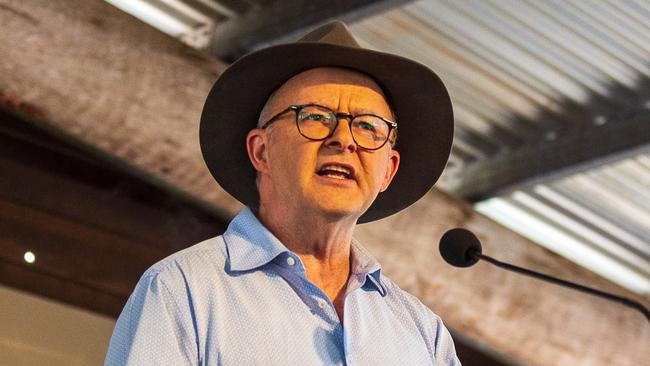
The Prime Minister’s speech accepted the Uluru Statement from the Heart with the generosity of spirit in which it was offered to the Australian people five years ago, and explained how it would be symbolic and practical by providing Indigenous Australians respect, truth and unity coupled with a say in programs, policies and laws.
The task now is for all Australians, not just politicians or Indigenous leaders, to make the case for why the voice should be supported. The referendum to enshrine the voice in the Constitution before the next election will be a defining moment for Australia. It is too important to be left to legislators and activists because we all have a stake in it.
All Australians of goodwill, dedicated to reconciliation and recognition, should accept the responsibility to explain and argue the case for constitutional change with family, neighbours and friends, in workplaces and in community, civic and faith organisations. It is incumbent on all of us to ensure that it succeeds.
It is understandable that Australians want to better understand how the voice will work. Senator Pat Dodson, the government’s special envoy for reconciliation and implementing the Uluru statement, soon will outline principles for how it would operate. There are also reports commissioned by the parliament or government that explain it in detail.
The voice is a simple yet momentous proposition, as Albanese said, that aims to unite and uplift the nation in a spirit of reconciliation and to advise politicians on policies and programs to close the gap on health, education, employment, housing, justice and safety. The notion that First Australians have a say in lawmaking is itself an act of recognition.
It is a conservative idea in that all it asks for is the opportunity to advise parliament through a new institution. It would have no veto power. It will not be a third chamber of parliament. The House of Representatives and the Senate will continue to make laws, regulations and pass motions regardless of what the voice may advise.
The Uluru statement is about bringing all Australians together in a new partnership that will foster responsibility and opportunity. We should all be deeply troubled by the entrenched disadvantage that many Indigenous Australians face and how billions of dollars of programs over many decades have not had the impact that it was hoped they would.
The voice recognises that First Australians respect our democratic institutions and want to have a say so they can be more effective. Albanese spoke about Indigenous ranger and justice reinvestment programs, designed and run by Aboriginal Australians, that have provided worthwhile jobs and reduced crime.
Reactionary conservatives are propagating falsehoods to undermine the voice. It is not an Indigenous parliament. It is not about inserting a racist institution into the Constitution or introducing racial apartheid. It is not about special treatment. Similar claims were made 30 years ago in response to the High Court’s Mabo judgment and the subsequent Native Title Act. And having 11 MPs with Indigenous heritage is not a voice to parliament.
Albanese sought to demolish these myths in his speech to the Garma Festival. For the moment, he wants Australians to understand what the voice is and is not. It is, he says, a proposal that speaks to the elemental Australian values of fairness, respect and decency. It would be a national achievement that is above politics. Not allowing the debate to be hijacked by immediately responding to calls for detail from people who would never support it anyway is the right approach.
As a starting point for discussion, Albanese proposed three straightforward provisions be added to the Constitution with a simple referendum question: Do you support an alteration to the Constitution that establishes an Aboriginal and Torres Strait Islander voice? The three provisions, first, establish an “Aboriginal and Torres Strait Islander voice”; second, explain that it can “make representations” to parliament and government on matters relating to Indigenous Australians; and, third, note parliament will determine “the composition, functions, powers and procedures” of the advisory body. The last is important because, as I have argued previously, it preserves the authority of the parliament and means the structure can be changed by the parliament rather than only by further cumbersome, expensive and risky constitutional referendums.
The notion that bipartisanship is needed for a successful referendum is a trap. It has been more than two decades since the last referendum. Old certainties and established wisdoms of politics are changing. There was no social media, for example, when the last referendum was held. Voters are less trusting of major parties. They are more likely to be persuaded by friends, family and colleagues.
Bipartisanship is welcome and encouraged but probably a dead end because it is unlikely the Liberal and Nationals parties will formally support a voice to parliament. The last three Liberal prime ministers erroneously labelled it a third chamber. Some Liberal MPs may, however, still support the referendum.
There is enormous goodwill for a voice but there is still work to be done to ensure the referendum is carried. It is encouraging that business, unions, churches and faith groups, charitable, sporting and civic organisations, and the legal community support it. This is where the referendum will be won. We need to maintain this momentum. History is calling on all of us.




The vital cause of recognition and reconciliation took an important step forward last weekend when Anthony Albanese formally outlined a detailed proposal for a constitutionally enshrined voice to parliament for Aboriginal and Torres Strait Islander Australians at the Garma Festival in northeast Arnhem Land.